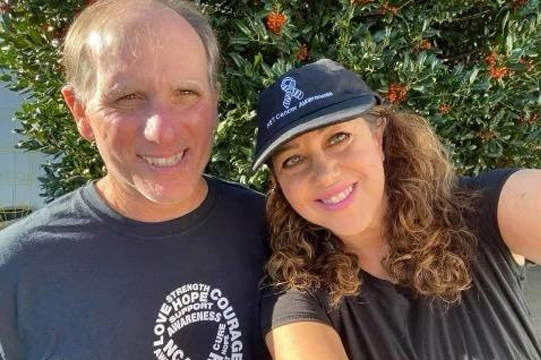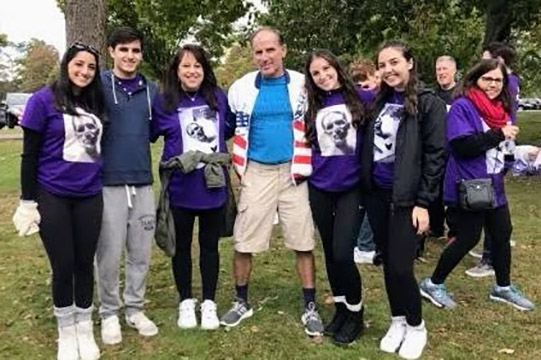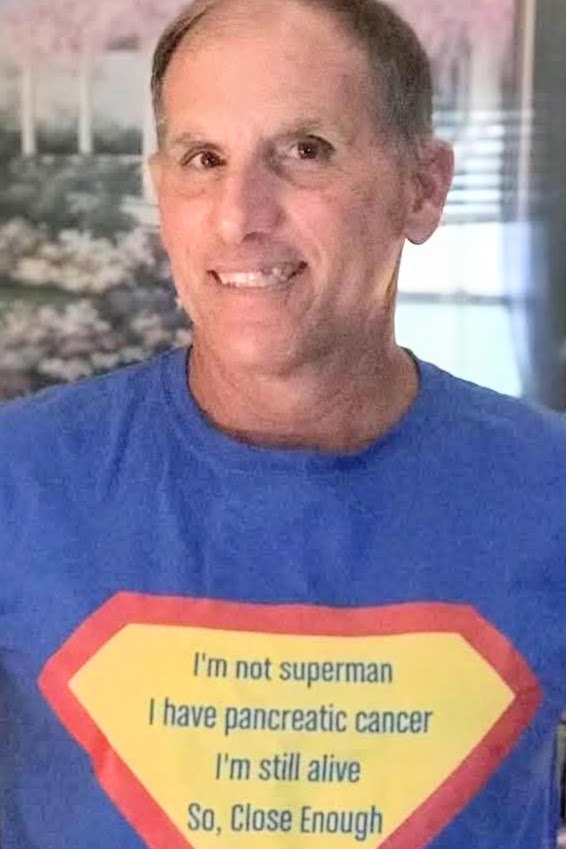

He Lost A Hard Fought 5-Year Battle To Pancreatic Cancer.
Following Was His Original Warrior Story.
JOE ALLER’S PANCREATIC CANCER STORY
Written By: Julia Brabant
May 2023
Date of Diagnosis: July 6, 2018
Current Status: Palliative Treatment Continues
The Link Between Biomarker Testing & Cancer Treatment Options
When Sue and Joe Aller learned Joe had pancreatic cancer and that his tumor was inoperable, they were willing to go to just about any length to get his health back on track. While Joe wound up trying everything from clinical trials to multiple forms of chemotherapy, it was a decision to have his tumor tested for abnormalities that ultimately saved his life.
Joe, who lives in Oceanside, New York, started having stomach pains in the springtime of 2018, prompting a visit to urgent care. After some tests, the urgent care doctors thought he had an aortic embolism. At first, they told him to go to the local hospital. They then switched gears, recommending he head straight to a radiologist for a CAT scan instead.
Joe did so, and after some back-and-forth between the urgent care doctors and the radiologist, he learned he had pancreatic cancer.
“I had that gut feeling,” he said. “I knew in my heart it was going to be cancer.”
Joe had long suspected that environmental factors might have placed him at an elevated risk for cancer. He’d lost a twin brother to childhood cancer, and his father and sister had also died from esophageal and ovarian cancer, respectively. There was also an especially high incidence of cancer among residents and former residents of Joe’s hometown, of Bethpage, New York. Many suspect this “cancer cluster” is the result of an aerospace plant that used to operate in the area dumping toxic chemicals within city limits.
The radiologist who performed Joe’s tests gave his scans to Sue, who then uploaded them to a website of a major cancer center in the area, Memorial Sloan Kettering. This prompted a call from the center, and administrators scheduled Joe to come in within the week. There, Joe’s doctor identified an 11-cm tumor that had wrapped around an artery, making a biopsy they had planned for him more complex.
Joe’s doctor determined he had a pancreatic neuroendocrine tumor (NET), which is less common than a pancreatic adenocarcinoma. This rare form of the disease that affects about 1% of pancreatic cancer patients, including Aretha Franklin and Steve Jobs. The doctor advised Joe to see a neuroendocrine specialist.
During the meeting with the NET specialist, the nurse asked Joe and Sue how they felt about having biomarker testing done on the tumor. The nurse said that even if the test didn’t wind up helping Joe’s case, it could very well help future patients with NETs.
Joe and Sue were on board, and the biomarker tests determined that Joe’s tumor had an NTRK mutation. This particular mutation is often present in patients with childhood and thyroid cancers.
Because the test identified this gene mutation, Joe became eligible for a newly FDA-approved drug, Larotrectinib. Since he had already started oral chemotherapy, though, he had to wait until he finished chemo to try it.
The drug worked wonders initially, and Joe remained essentially cancer-free for about two years after he started taking it. He’d retired in the wake of his diagnosis, but he managed to live a relatively normal, active lifestyle that included playing roller hockey and going on long bike rides while taking Larotrectinib, too.
 Yet, by 2020, Joe’s doctor determined he was becoming resistant to the drug and that his tumor had started to grow. The tumor had also metastasized to his liver, which was concerning. They felt the liver issue was more pressing than the cancer and chose to treat it as such.
Yet, by 2020, Joe’s doctor determined he was becoming resistant to the drug and that his tumor had started to grow. The tumor had also metastasized to his liver, which was concerning. They felt the liver issue was more pressing than the cancer and chose to treat it as such.
In February of 2020, Joe had an ablation, which is a procedure that seeks to destroy liver tumors without actually removing them from the body. With that out of the way, Joe soon joined a clinical trial, which involved taking a drug called selictrectinib.
Right around this time, the COVID-19 pandemic began, complicating Joe’s care – and Sue’s ability to be there during treatments and otherwise continue to act as his advocate. Despite this setback, Joe responded well to the clinical trial at first.
After about six months, though, Joe stopped responding to the drug used in the trial. He started traditional chemotherapy but developed several major complications as a result, including blood clots and a hematoma in his left quad.
Doctors stopped Joe’s chemo in December 2021. He was gaining strength and getting more exercise than he had in a long time when a bout with pneumonia sent him back to urgent care.
Doctors at the hospital then surprised Joe and Sue by recommending that Joe enter hospice. Shocked, particularly because he’d been doing and feeling so much better prior to developing pneumonia, Joe refused, and he, Sue and his medical team went back to the drawing board.
Within weeks, Joe’s doctor had identified another possible clinical trial for Joe. This one involved taking a particular drug, repotrectinib. Because of his past medication history, however, Joe was unable to participate in the trial. Yet, he soon learned he could get the drug through “compassionate care,” which involves making a new, currently unapproved prescription drug available to a patient who has a serious condition and no other options available.
It took about five months to secure the drug, and during this stretch without treatment, Joe’s condition worsened. He needed several blood transfusions and experienced liver failure, among other complications. He also dropped about 60 pounds and developed several infections, delaying his ability to take the new drug he’d fought so hard to get.
“Here, you have this lifesaving drug in your hand, and you can’t give it to him,” Sue said. “It’s like you’re just watching your husband die.”
Given the desperate nature of the situation, Sue and Joe called their four children, all of whom were college students, and had them come to New York to see him. Doctors then gave Joe two choices: he could either go into hospice at home, or go home without hospice and give the new drug a try.
He opted for the latter. Sue secured a wheelchair and had a chairlift installed in their home to help Joe stay mobile, and he began taking the new medication. He saw improvement within about a week, but several infections and complications again followed.
As part of his ongoing treatment, Joe continued to take blood tests, and one of them identified a new BRAF gene mutation. In total, researchers had identified about 10 genetic mutations in his tumor, but they considered the BRAF mutation to be the strongest and most concerning.
While the Allers and their medical team explore the possibility of trying new drugs that are FDA-approved for patients with the BRAF gene mutation, Joe will continue to undergo palliative chemotherapy. For now, the treatment is working well, so Joe’s doctors want to get as much mileage as possible out of it. Doctors also wound up changing Joe’s initial diagnosis, determining he has mixed acinar neuroendocrine pancreatic cancer. This is one of the rarest forms of the disease, affecting less than 1% of patients.
Researchers also plan to feature Joe’s case in an upcoming medical journal detailing how the identification of gene mutations in his tumors helped him access what wound up being a life-saving drug. In the meantime, he and Sue have begun making connections within the greater pancreatic cancer community, participating in fundraising walks and chronicling Joe’s journey via a CaringBridge page, CaringBridge.org/public/JoeAller.
They’re also both big believers in prayer, regardless of one’s religion.
“You don’t have to be religious to pray,” Sue said. “You can pray anywhere you feel comfortable; you can pray at home.”
They’re also grateful for their friends and loved ones who’ve been praying alongside them, and Joe, in particular, expressed his gratitude for Sue, with the pair acknowledging that serving as someone’s caregiver can be a rough road.
Joe and Sue also had some advice for patients and caregivers handling their own cancer diagnoses.
“Get to a big cancer center where they’re doing research,” Sue said. “If it hadn’t been for the research, Joe wouldn’t be here now. You need to be where the best people are doing their best research.”
Joe also notes that, in his case, he found it helpful to avoid reading about the side effects of each drug he had to take and that he did his best to avoid fixating on his condition.
“For me, I try not to worry too much about the disease – I just didn’t have it in my brain that I was going to die,” he said. “Try not to be so engrossed in worrying. There’s so much going on in terms of research and new drugs – there’s a lot of hope out there for people trying to knock this thing down for good.”
Joe and Sue also noted that it’s important for both patients and caregivers to learn how to say “no” when a proposed treatment or plan doesn’t meet their needs. Sue recalled a time when Joe, who’d been having a rough go, health-wise, had a serious craving for a burger. Despite the fact that he was on oxygen, in a wheelchair and had dropped down to about 100 pounds, Sue intended to make that happen.
Yet, shortly after they’d gotten situated at the restaurant, Joe’s doctor called and asked them to bring Joe in right away.
“Sometimes, you just have to say no – no; he’s not coming in right now; he’s going to enjoy his burger,” Sue said. “You have to be the advocate, and sometimes, that means you have to be firm.”
Joe will continue to undergo palliative chemotherapy until they determine if his BRAF gene mutation means other treatment options may be available.
He is set to celebrate five years of survivorship July 6, 2023.

So happy for you both! You’re a warrior Joe and you have an amazing advocate in Sue! Best wishes for continued success. You and your family are in my prayers.
Thank you so much!
His case is so much like my daughter’s. Keep fighting!
Thanks for sharing your journey. You are correct when you write about where you get treated matters. My husband had the same cancer, but actually the tumor was smaller and had not impacted the artery. Not many options were given, other than trying to shrink the tumor. Thank you. You help people to know it is worth the fight! Praying for you and your caregiver.
Sorry for your loss. Thank you for posting Joe’s story as my cancer has come back and thought not to fight it but his story makes me want to rethink my decision as he fought so hard.